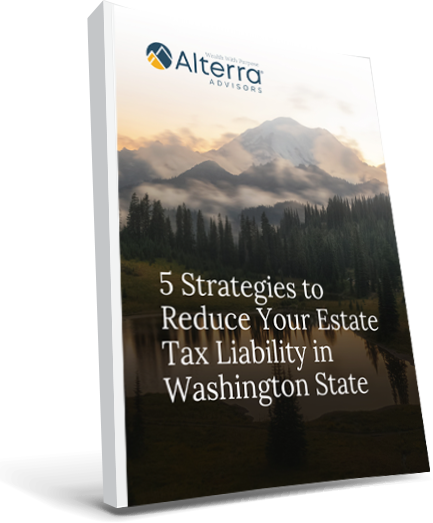What started as a dream in your garage is now a thriving business! You’ve worked hard and now see a sale in your future…and a sizeable tax bill. In this Business Owners Edition of our Strategic Guide to Highly Appreciated Assets, we’ll look at a case study and strategies to consider if you find yourself in this situation.
Here are links to our intro, stock and real estate editions.
- Taxes & Highly Appreciated Assets – An Introduction
- Taxes & Highly Appreciated Stock
- Taxes & Highly Appreciated Real Estate
Here’s a common scenario. 20 years ago, you started as a solopreneur and now have a team of 25 people running a multimillion-dollar business. Last year – your best year ever – the business grew, and you personally made over $1,000,000 for the first time.
You’re 61 years old and even though you love your work, you can’t really see yourself working this hard for too much longer – especially since you’ve got grand kids now that you’d rather be spending time with. You know that 5-10 years from now you want to be out completely, but you’re not sure how to do that without giving up control. A recent valuation said your “little business” is worth $10,000,000 now and your CPA says that if you sell outright, you’ll owe $2,400,000 in taxes. Ouch.
What should you do? Here are a few strategies to consider for three common primary goals.
- Support your family during your life.
- Provide for your family after you’re gone.
- Maximize impact on causes you care about.
Goal 1 – Support my family during my life.
You’ve invested well, but you’ll still need the proceeds from this sale to make all those retirement dreams come true – and loss to taxes could limit what you’re able to accomplish. What can you do?
- Sell the business outright to a key executive or an outside buyer. You get the money and pay the taxes upfront and ride off into the sunset. You’ll need a plan to turn the remaining $7,600,000 (after taxes) into lifetime retirement income. You’ll also owe a hefty tax bill, but it’s simple, clean and easy. To spread the taxes out over time, consider an Installment Sale rather than receiving the proceeds in a lump sum.
- Sell shares over time to a key executive or family member. This could be for you if you’d like to stay involved in the business a little longer while slowly giving up shares. A Restricted Bonus 162 Plan could also help retain your key executive and build funds to buy you out completely in 5-10 years.
- Transfer shares of the business to a Charitable Remainder Trust before you sell it. Consider this if you have charitable intent – this isn’t simply a tax saving strategy, as the IRS will often disallow the deduction if you transfer the business to a CRT and immediately sell. Properly implemented, you’ll get an upfront tax deduction, save the tax bill on the sale, and receive income from the trust to support your living expenses. And, because the remainder passes to charity when you die, you’ll also make a significant impact on causes you care about!
Goal 2 – Provide for my family after I’m gone.
Your retirement needs are taken care of and you’re focused on funding business startups or other educational pursuits for future generations. You want to maximize the proceeds for the family and not lose more to taxes than necessary. What should you consider?
- Create a Family Limited Partnership and gift shares of the business to the kids each year. You keep control of the business during the transfer and, because you’re gifting small percentage interests, you can typically gift them at a discount. This helps reduce transfer taxes, especially in estate tax states. If only one child wants to own the business, consider gifting part of the business to them while making equal gifts to a Wealth Equalization Trust for the others. You’ll still reduce taxes and feel like you’ve made equal impacts to each child.
- Sell shares in the business and invest the proceeds in an Opportunity Zone qualified investment. You’ll defer the tax for seven more years and not take the full tax hit in a single year. You’ll also avoid income taxes on the growth of Opportunity Zone investment dollars. In the seventh year, you can further reduce taxes by Tax-Loss Harvesting other investments.
Goal 3 – Maximize impact on causes I care about
With all your newfound freedom, you’re focused on funding bigger initiatives to help the less fortunate and every tax dollar paid is one less dollar going to charity. What are your options?
- Gift shares of the business to your Donor Advised Fund (DAF) before you sell it. You’ll eliminate capital gain taxes on those shares and receive a charitable deduction to minimize the taxes due on the remaining shares. The shares in your DAF can be sold tax-free and create a large charitable gift now or fund giving for many years to come.
- If you’d like to have access to income while you’re alive, consider the Charitable Remainder Trust previously mentioned – you can always give that income away if you don’t need it!
With so many possibilities, which is right for you? Consult your financial team! You might require a mix of strategies listed here and others that we didn’t have time to dive into. But with a coordinated plan, you can be sure that your years of hard work will pay dividends for you, your family, and the causes that you care about for decades to come.
Zach Hamilton
CFP®
Partner, Financial Advisor
About the Author
Zach graduated from Gonzaga University with degrees in Marketing and Finance. While growing up, Zach heard stories from his grandfather about his work as an insurance agent, and other stories from his dad who was an investment manager. They both spoke financial “languages” but had completely different dialects. Recognizing the breadth of the financial vocabulary ultimately led to Zach’s passion for financial planning. He credits his family for this enthusiasm. Zach sees his time with clients as an opportunity to translate all of the different – and often confusing – information they’ve heard and provide clear guidance for each unique situation.
Zach enjoys working with people – his clients – who also appreciate that their financial decisions have an impact not just on themselves, but also on their families, charities and their own life legacy. Many of Zach’s clients have a strong desire to “make a difference”, and they rely on his financial expertise to magnify their philanthropic goals.
The “Alterra” name was coined by joining the Latin roots “alter”, the origin of the word “altruism” with “terra” meaning earth or land. This name reflects the company philosophy of “clients before profits” and providing firmly grounded advice.


